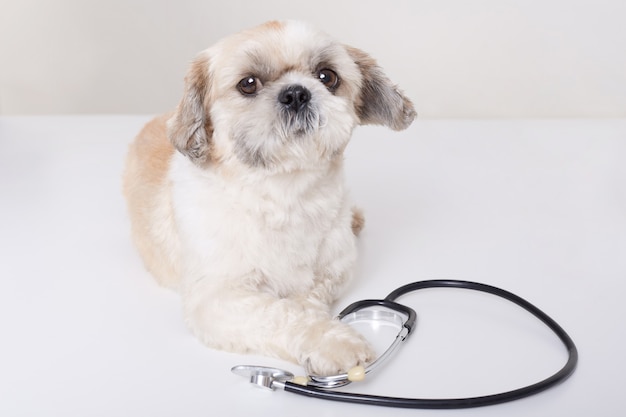When Is Coughing in Pets a Reason to See the Vet?


When Is Coughing in Pets a Reason to See the Vet?
Does your dog, cat, or horse seem to be coughing more frequently than usual? As pet owners, it’s natural to worry when your beloved companion develops a cough that won’t go away or suddenly becomes more severe. At Green Tree Animal Hospital, located at 4371 Old Harrodsburg Road, Suite 140, Lexington, KY 40513, we know how important it is to distinguish between a mild, fleeting cough and a symptom that signals something more serious. Our team of veterinarians is dedicated to guiding pet owners in Lexington and surrounding communities through understanding pet coughing symptoms and knowing exactly when to seek veterinary care.
In this comprehensive guide, we’ll explore the most common reasons pets cough, how to recognize concerning signs, and what steps you should take to keep your pet healthy. You’ll also learn about the specific services we provide, such as diagnostic evaluations and wellness examinations, to help manage your pet’s respiratory health. Whether your pet is a playful puppy, a senior cat, or a cherished horse, knowing when to schedule an appointment with your local vet near me can make all the difference in their long-term wellbeing.
Recognizing Coughing Symptoms in Pets: What’s Normal and What’s Not?
Coughing is a natural reflex in many animals, but discerning normal from worrisome can be challenging. Pets may cough occasionally due to dust, excitement, or even a tickle in their throat. However, certain pet coughing symptoms can indicate underlying health issues that require a closer look from your veterinarian near me.
Signs That Warrant Attention
Key symptoms to watch for are coughing that persists for more than a few days, frequent coughing episodes throughout the day, or coughing that seems to worsen at night or after exercise. Other concerning signs include coughing accompanied by difficulty breathing, a bluish tint to the tongue or gums, loss of appetite, lethargy, or coughing up blood or thick mucus. In horses, coughing during exercise or while eating can sometimes signal respiratory or airway problems that also deserve prompt evaluation.
It’s important to consider your pet’s age and medical history as well. Senior pets, animals with heart disease, or those with a history of respiratory issues are more vulnerable to complications from coughing. At Green Tree Animal Hospital, we always encourage pet owners to err on the side of caution and consult with our veterinary team if you notice persistent or severe symptoms.
For routine wellness checks and ongoing monitoring of your pet’s respiratory health, a wellness examination can provide peace of mind and early detection of potential problems.
Understanding the Causes of Coughing in Dogs, Cats, and Horses
Coughing in pets can stem from a wide variety of causes, ranging from minor irritations to serious medical concerns. Understanding why your pet may be coughing helps guide the next steps and ensures timely, appropriate care.
Common Causes in Dogs
In dogs, the most frequent triggers for coughing include respiratory infections such as kennel cough, which is highly contagious in social settings like boarding facilities or dog parks. Heart disease, especially in older dogs, can also cause a persistent cough due to fluid accumulation or pressure on the airways. Additionally, allergies to environmental factors like pollen or dust, collapsing trachea in small breeds, and even the presence of foreign objects stuck in the throat can all lead to coughing.
Coughing in Cats: What to Watch For
Cats are less likely to cough than dogs, but when they do, it often signals an underlying issue such as feline asthma, respiratory infections, or heartworm disease. Hairballs are a common cause of hacking that can be mistaken for coughing, but true coughs tend to be deeper and more persistent. If your cat’s cough is accompanied by open-mouth breathing, wheezing, or lethargy, it’s time to seek veterinary services near me.
Equine Coughing: Considerations for Horses
Horses may develop coughs due to respiratory infections, allergies, dusty environments, or inflammatory airway disease. Chronic coughing in horses, especially when associated with exercise intolerance or nasal discharge, can indicate conditions like heaves or even equine influenza. Because horses have unique respiratory systems, any cough that persists or worsens should be evaluated by a veterinary team experienced in equine medicine.
No matter the species, if you’re unsure about the cause of your pet’s cough, our veterinarians can help determine whether further diagnostics or treatment are needed. You can learn more about how we approach complex cases through our internal medicine services.
Treatment and Management: What to Expect from Your Veterinarian
Once you’ve decided to seek professional help for your pet’s cough, you might wonder what happens next. At Green Tree Animal Hospital, our approach to treating pet coughing symptoms in Lexington starts with a thorough exam and a conversation about your pet’s health history.
Diagnostic Steps
The evaluation may include a physical exam, listening to your pet’s heart and lungs, and gathering information about their environment and recent activities. Additional diagnostics such as chest radiographs (x-rays), bloodwork, or even specialized tests like heartworm screening or airway sampling might be recommended based on your pet’s species and symptoms.
For horses or exotic pets, diagnostic steps may vary, but the goal remains the same: to pinpoint the underlying cause and guide effective treatment.
Treatment Approaches
Treatment options depend on the cause of the cough. If an infection is present, your veterinarian may prescribe antibiotics or antiviral medications as appropriate. For heart-related coughs, medications to support cardiac function and reduce fluid buildup may be needed. Allergic coughs often improve with environmental changes and, in some cases, allergy medications. For pets with airway issues like collapsing trachea or feline asthma, treatments may involve bronchodilators, anti-inflammatory medications, or even lifestyle adjustments to reduce stress and exposure to irritants.
Throughout the process, our veterinarians ensure you understand your pet’s diagnosis and treatment plan. We also offer ongoing support through follow-up visits and preventive care programs tailored to your animal’s needs.
Prevention and Home Care: Supporting Respiratory Health
While not all causes of coughing can be prevented, there are practical steps you can take at home to help maintain your pet’s respiratory health and reduce the chance of more serious problems developing.
Steps for Prevention
For dogs, keeping vaccinations up to date, especially for kennel cough and canine influenza, is essential if your pet frequents boarding facilities or dog parks. Maintaining a clean living environment and reducing exposure to dust, smoke, or chemical irritants will also help protect sensitive airways.
Cats benefit from regular grooming to minimize hairballs and keeping their litter boxes clean to reduce dust exposure. For cats prone to asthma, using unscented, dust-free litter and avoiding aerosol sprays can be helpful.
Horse owners should ensure stables are well-ventilated and bedding is low in dust. Feeding hay at ground level, soaking hay, and minimizing dusty feeds can all help reduce the risk of respiratory irritation.
No matter the species, regular wellness examinations are your best line of defense for early detection and prevention of respiratory issues. Our team can provide personalized advice based on your pet’s lifestyle, medical history, and the specific conditions in Lexington and surrounding communities.
When to See a Vet: Knowing the Right Time for Professional Help
Determining when to seek veterinary care for your pet’s cough can feel overwhelming, especially when symptoms vary from mild to severe. As a general rule, any cough that persists for more than several days, worsens suddenly, or is accompanied by additional symptoms such as labored breathing, loss of appetite, lethargy, or blue-tinged gums should prompt a call to your veterinarian near me.
You should also schedule an appointment if your pet has a known heart or lung condition, is very young or elderly, or if their cough is interfering with eating, drinking, or normal activity. For horses, coughing that occurs during exercise or is associated with nasal discharge should not be ignored.
Remember, early intervention is key to preventing complications and ensuring the best possible outcome for your pet. If you’re ever uncertain, our veterinary professionals at Green Tree Animal Hospital are here to provide guidance and support. We have the expertise to handle pet coughing symptoms in Lexington and can recommend the most appropriate next steps for your pet’s situation.
For emergencies or sudden, severe symptoms, our emergency veterinary care page provides more information on what to do and how we can help.
Take Action for Your Pet’s Respiratory Health
Coughing can be a sign of anything from a simple throat irritation to a more serious health concern. By staying attentive to your pet’s coughing patterns and knowing when to seek professional help, you can safeguard their wellbeing and enjoy many healthy years together. At Green Tree Animal Hospital, we are committed to supporting pet owners throughout Lexington and surrounding areas with comprehensive, compassionate veterinary care.
If your dog, cat, or horse is experiencing persistent or concerning coughing, don’t wait—schedule an appointment with our experienced veterinary team today. We offer thorough wellness examinations and advanced diagnostics to address pet coughing symptoms in Lexington. Our focus on prevention, education, and ongoing care means your pet will always receive the attention they deserve from a quality vet near me.
For questions or to book a visit, call us at (859) 223-2221 or stop by our convenient location at 4371 Old Harrodsburg Road, Suite 140, Lexington, KY 40513. Our veterinary professionals are here to help you and your pet breathe easier—today and every day.
Disclaimer: The information in this article is intended for educational purposes only and does not replace professional veterinary advice. If your pet is exhibiting severe or sudden symptoms, contact your veterinarian immediately for an assessment.





_corporate_logo-1920w.webp)
















